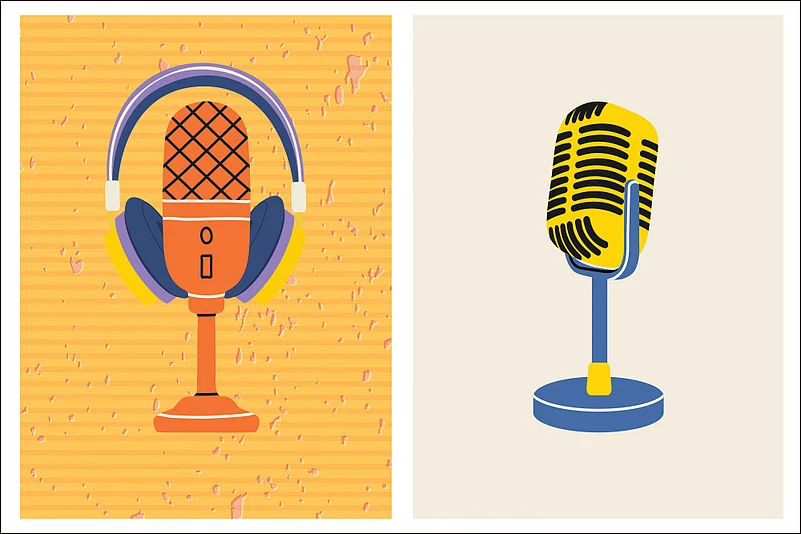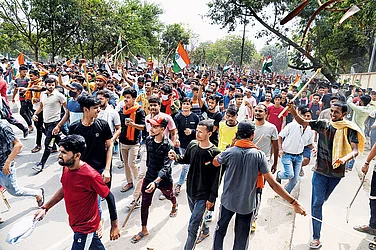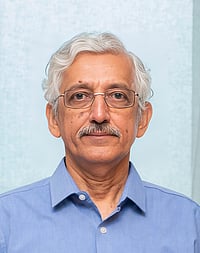Jishan Anjum started listening to podcasts five years ago, when the audio format had just begun to pick up the pace. Now hooked to them, the 23-year-old public relations professional listens to podcasts on his way to work on weekdays and at home on weekends. His favourites are history podcasts, like Empire by William Dalrymple and Anita Anand, but he also listens to the ones on business, and occasionally satire. “Listening to my favourite authors and influencers talk in a casual environment keeps me hooked,” says Anjum.
India, with 57.6 million monthly listeners as per the data up to 2019, was the third-largest podcast-listening market in the world after China and the US, according to PWC’s Global Entertainment & Media Outlook 2020–24 report. The report called India “the sleeping giant of the global podcast market”, noting that the country would see “strong increase at a 30.4% CAGR in its monthly podcast listener base” from 2020 to 2024, with simultaneous increase in advertisement revenue.
The excitement around podcasts, which are digital audio programmes, has been intensifying over the past few years. Global services and advisory firm KPMG predicted that the podcast-listening market in India was expected to grow at a compound annual growth rate (CAGR) of 34.5% to reach a valuation of Rs 17.62 crore by 2023.
In this growing market of podcasts, Covid-19 pandemic emerged as a boon for the industry. News reports support this argument, citing a KPMG report that suggested that India’s podcast consumption increased by 29.3% in the first year of the pandemic. The trend continued in 2022 as well. A survey conducted by podcast network IVM Podcasts–Pratilipi in association with mobile research platform InMobi Pulse and InMobi group-owned Glance indicates that 81% of podcast listeners heard their first podcasts in 2022.
The Podcast Appeal
Nikesh Murali’s Indian Noir is a podcast with spine-chilling crime and horror stories. Launched five years ago, it has had about two million downloads. “Spotify this year announced Indian Noir as one of the pioneers of podcasting in India for pushing the boundaries technically and content-wise,” says Murali.
While some podcasts are in the form of conversations with field experts, like Paisa Vaisa with Anupam Gupta, others like Maha Bharat with Dhruv Rathee directly talk to the listeners. Irrespective of the format, podcasts in India have gathered great momentum, thanks to the increasing numbers of listener and overall widening base of internet users.
Another important aspect is the ease of consumption. “Podcasting offers the opportunity to the listener to learn or entertain themselves in a fashion that is not too stressful to the eyes and more rewarding to the mind,” observes Murali. “Podcasts are called a companion medium as listeners do not need active screen time and can listen to the audio while doing other activities,” says Mae Mariyam Thomas, founder of podcast production company and consultancy Maed in India. She has a show by the same name.
Podcast is a unique medium that engages people during mundane tasks, while helping gain deeper insight into subjects. Amit Varma, who hosts long-form conversation podcast The Seen and the Unseen, feels that people crave depth, which is missing in short-form video formats like Instagram reels or YouTube shorts. “I once did an episode with Karthik Muralidharan (an economist) on Indian education. It became a cult favourite. It lasted around 200 minutes. He had it transcribed; it came to over 40,000 words. That is half a book,” he says. The popularity of his shows was proportionate to the length. “It was not just the absolute numbers that exploded. It was the engagement,” he adds. His own podcast, he says, is “meant to be discursive, to have thehrav (pause)”.
The raw and authentic nature of a podcast builds an intimate connection with the listener. “The podcaster becomes an old friend—and the podcast becomes a habit, even comfort food,” says Varma, who gets about 250,000 downloads a month. “The most interesting part about the podcasts is their relatability and the intriguing stories they tell. These podcasts also feature interactions with prominent guests,” says Anjum.
Ranveer Allahbadia has more than 6.5 million subscribers on his YouTube channel, BeerBiceps. On his show, The Ranveer Show, which is also available on other podcast streaming platforms, he has invited some of the most renowned faces in the fields as diverse as spirituality, business, sports, health and geopolitics. The podcast show, launched in 2019, is managed by Monk Entertainment, an influencer marketing and management company which Allahbadia co-founded in 2017 with Viraj Sheth, also its chief executive officer. “About three editors, two videographers work for the podcast. There is one person for research and one person for outreach as we are doing 15 episodes a month and there is a constant flurry of guests,” says Sheth.
Shrishti Malhotra, host of Respectfully Disagree, a podcast on digital publication platform The Swaddle, says, “The approach is to always look at a podcast as a multimedia project. So, we take advantage of our following across multiple mediums like reels, shorts or YouTube explainers to try and cross-promote and bring in audiences from different platforms.”

Where the Interest Lies
Podcasts can be generic, like the one by Allahbadia, or focused on specific subjects like entrepreneurship, business and finance, etc. Bombay Shaving Company’s founder Shantanu Deshpande runs a podcast called The BarberShop, where he explores the nuances of entrepreneurship through conversations with successful businesspeople. Nikhil Kamath, the co-founder of Zerodha, started his podcast, WTF is with Nikhil Kamath, last year. The eight-month-old podcast is ranked sixth on Apple iPhone’s Podcasts application.
There is an emergence of GenZ podcasts, started by GenZ kids, like Untriggered by Amin Jazayeri a.k.a. AminJaz and The Mythpat Podcast by Mithilesh Patankar. The multiplicity of creators across genres adds to the variety of content available in India. However, a few genres, like self-help, motivation, entrepreneurship and others, stand out.
The appreciation and increasing interest shown by the listeners are incentives for creators to enter the podcast industry. In less than a year, Spotify, a music and podcast streaming platform, launched approximately 30 original podcasts with local creators in 2021. JioSaavn, an Indian streaming platform, saw its content rise 200 times in 2020 compared with the previous year.
Dhruvank Vaidya, head of podcast in Spotify, says, “One of the biggest spaces that is growing is knowledge and learning, followed by personal finance and investing.” The third genre of content is motivation, inspiration and self-help. According to a survey conducted by Spotify and YouGov, a global public opinion and data company in the year 2021, 50% of Indians preferred to listen to at least one episode of self-help and motivating podcast every week.
“The other trend that we have seen in 2023 is a huge uptake in devotional content,” he adds. According to insights from its annual campaign, Wrapped, the Shrimad Bhagavad Gita is the most-streamed podcast on Spotify in India in 2023, while Krishna—The Supreme Soul is at the third place.
Business of Podcasting
The total entertainment and media revenue in India is projected to increase by more than 7% CAGR between 2022 and 2027, according to PwC’s Global Entertainment and Media Outlook 2023–2027 report. Additionally, digital components are expected to drive the growth of the advertising market revenue, even as TV advertising revenue stagnates, as per the report’s projections for 2027. According to the PwC report, the Indian internet advertising market, among the fastest growing in the world with a 12.3% CAGR, is expected to see total revenue climb from $4.4 billion in 2022 to $7.9 billion by 2027.
“While podcasts by themselves are free for listeners to subscribe to and listen to and there are the traditional and well-established monetisation formats like ads and sponsorships, monetisation models for podcasts are evolving,” states an article, The Rise of Podcasting in India, published by the Indian School of Business in 2022.

Among the various avenues available for podcast monetisation, social media has its own part to play. It can increase the reach of podcasts to attract new listeners and increase their popularity. YouTube which hosts most of these video podcasts can be a good platform from the perspective of revenue generation for those with large number of viewers. “If you generate about five million views per month, you can make anywhere between Rs 50,000 and Rs 1 lakh from YouTube AdSense,” says Sheth. Host-advertising, where the podcast host inserts advertisements in the audio, offers a refreshing and effective marketing tool to companies while bringing money to the podcaster.
Talking about more revenue streams available for podcasters at Monk Entertainment, Sheth says, “There are brand revenue, speaking gigs and offline events through which podcasters earn money. We also help creators monetise their content through licensing the rights of their shows to other platforms.” Some podcasters have a Patreon page, where they can get donations from listeners. Good content creators can also get revenue from the subscription model, where listeners pay for premium content. Show sponsorship and creation of fresh content for brand promotion are the other available options for making money in the industry.

At Spotify, ad monetisation started in December last year with the launch of Spotify Audience Network (SPAN). Says Vaidya, “Advertisers can buy audiences across the SPAN network. For whatever advertising that gets sold, there is a revenue share with the contract owner or the creator.” The company has managed to strike deals for advertising with Audio Pitara, an audio platform, and Ideabrews, a podcast production company. Spotify hosts podcasts on its creation platforms Megaphone and Spotify for Podcasters (S4P), formerly called Anchor, from where they can be distributed on Spotify and other platforms. Alternatively, feed of podcasts distributed on third-party platforms can be transferred to Spotify. In both instances, the podcast creators can access the large music-listening audience space of Spotify.
Monk Entertainment, which currently represents 120 creators across various categories, has Ajio, an online shopping brand, and Mountain Dew, a soft drink brand owned by PepsiCo, onboard as sponsors for the podcast.
Manoeuvring Tailwinds
Despite multiple avenues for monetisation, it is difficult to get brands to invest in the nascent podcast industry. Also, for most of the podcasters who may produce great content but do not have big numbers to show, monetisation solely from podcasting can be an uphill task. Such creators must find their own ways of earning money because their show must go on. Varma teaches an online writing course. Mariyam, who has always enjoyed working in the audio medium, gets paid to handle the research, guest acquisition, production and distribution of others’ shows.
While there is an increase in revenue in internet advertising, competition too has increased. Although the size of the industry as of today is unknown, as there is no comprehensive industry report on it, the increasing interest of various stakeholders in podcasting is a reason for hope of a podcast revolution. In fact, Sheth feels that podcast is the next frontier in marketing.
Podcasting, as a new-age media platform, holds immense business potential, but creators will need to be mindful of the fact that the unique selling proposition of this format is the content, which is a necessary, if not sufficient, condition to sustain listener interest. Devoid of the typical glamour of entertainment platforms, podcasts will have to rely on quality content as the biggest differentiator amid rising competition in an ever-evolving landscape of audience engagement.
































